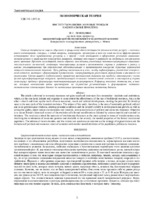| dc.contributor.author | Лемещенко, П. С. | ru |
| dc.coverage.spatial | Минск | ru |
| dc.date.accessioned | 2016-10-27T08:24:52Z | |
| dc.date.available | 2016-10-27T08:24:52Z | |
| dc.date.issued | 2015 | |
| dc.identifier.citation | Лемещенко, П. С. Институты развития: мировые тренды и национальные проблемы / П. С. Лемещенко // Экономическая наука сегодня : сборник научных статей / редкол.: С. Ю. Солодовников [и др.]. - Минск : БНТУ, 2015. - Вып. 3. - С. 5 - 14. | ru |
| dc.identifier.uri | https://rep.bntu.by/handle/data/26143 | |
| dc.description.abstract | Статья посвящена не совсем обычному и привычному для исследователя экономическому ресурсу – институтам и институциям, которые, с одной стороны, инициируют, организуют в той или иной степени эффективности использование этих традиционных ресурсов, а, с другой – сами впитывают и оформляют результат социально-экономического и нравственно-культурного развития, создавая потенциал к развитию на следующем историческом цикле эволюции. Предмет исследования, таким образом, это область устойчивых политико-культурных и социально-психологических отношений, создающие потенциальные условия и возможности страны к развитию и росту, а также устанавливающие при определенных обстоятельствах и проявляющихся интересах серьезные ограничения политико-экономической динамики. Цель работы заключается в том, чтобы зафиксировать российский исторический контекст эволюции с формальными проявлениями, инициированными различными внутренними и внешними институтами. Сделан вывод о необходимости проведения эволюционной динамики как наиболее оптимальной с точки зрения трансформационных издержек, предполагающей сочетание экономической генетики и имеющихся в стране ментальных свойств с формальным институциональным регулированием. Реформы последних десятков лет, а также текущая санкционная война ориентируют на стратегию регионализации и формирование политико-экономических союзов стран, близких по ментальным признакам населения, политиков, бизнеса. | ru |
| dc.language.iso | ru | ru |
| dc.publisher | БНТУ | ru |
| dc.title | Институты развития: мировые тренды и национальные проблемы | ru |
| dc.type | Article | ru |
| local.description.annotation | The article is devoted to economic resources not quite usual and customary for a researcher - institutes and institutions, which, on the one hand, initiate and organize to some extent the effectiveness of the use of traditional resources, but, on the other - absorb and draw up the result of socio-economic, moral and cultural development, creating the potential for development in the next cycle of the historical evolution. The subject of the study, therefore, is the area of sustainable political, cultural and socio-psychological relations, creating potential conditions and the country's ability to development and growth, as well as setting the guides, under certain circumstances and interests, serious restrictions of political and economic dynamics. Objective is to secure Russia's historical context of the evolution of a formal manifestations initiated by various internal and external institutions. The conclusion about the necessity of evolutionary dynamics as the most optimal in terms of transformation costs, involving the combination of economic genetics and available in the country, the mental properties of the formal institutional regulation. The reforms of recent decades, and the current war sanctions are oriented on the strategy of regionalization and the formation of political and economic union of countries with similar mental attributes of the population, politicians, business. | |

